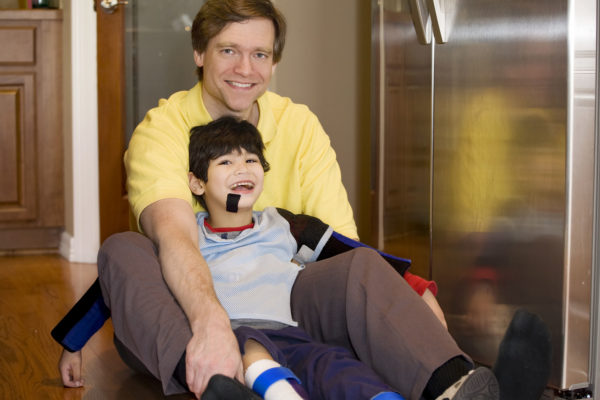How we move our bodies in space relies upon what is referred to as motor skills. The act of picking up a pencil relies on a ‘fine motor’ skill, whereas walking is considered a ‘gross motor’ skill. Depending upon your child’s diagnosed level of Intellectual Disability (ID) their skill development may progress normally, but for some it will be an area of challenge and for many it will not be achievable to develop all the skills required to function independently.

More severe levels of ID may require some adaptations to your child’s environment to enable them to have initial partial participation in activities. In the case of picking up a pencil your child might first need a chunky crayon, pencil grip or pencil writing claw. The gross motor activity of walking in the early years could be supported for instance by a gait trainer, a walking wagon and other walking trainers if required.
Your child’s ID will mean that they will have some degree of delayed response to verbal directions and environmental cues. If your child’s ID is associated with an Autism Spectrum Disorder(ASD) or Attention Deficit Hyperactivity Disorder(ADHD) then development of these skills could take a longer period of time due to the impact of these disorders.
For fine motor skills, you can assist your child in their development through the following activities:
- Get them familiar with using their hands- by placing your hand over their hand assisting with activities of picking up blocks and stacking them, reaching for and grasping objects, putting puzzle pieces into spaces
- Manipulating and developing eye hand co-ordination- have your child grasp a bubble wand and flick it to create bubbles and watch them float, thread large buttons/beads onto string, wind up toys with a mechanism and watch them move
For gross motor, the young child is using the larger and stronger muscle groups that enable a child to hold their head up, sit, crawl, stand, walk, run, jump, hop and skip. Again depending upon your child’s level of ID and any associated disability that is present, skill development in this area will be variable. The following activities may assist in development:
- Walking and running activities- access a safe environment where your child can learn to walk holding your hand and then without holding onto anything. Then encourage running in a small space such as in a game of ‘chasey’ so they are safe and begin to learn the difference between running and walking.
- Climbing, jumping and hopping activities-playing on climbing equipment in a park or playground or steps at your house. Jumping with both feet off the floor, use a mini trampoline and then move to hopping first using their preferred foot and then the other one.
- Catching and kicking activities- catching, throwing and kicking of balls of various shapes and sizes.
Development of fine and gross motor skills will help your young child with ID to move safely within many environments and support their health and well being. Fine motor skills will assist in their ability to be part of everyday activities in the home, at play, at early intervention, kinder and their readiness for primary school. Gross motor skill development will support your child in their ability to move around confidently across varying terrains and in different environments. It will also help to build confidence through adventure activities and learning the fundamentals of turn taking skills leading onto future team sports.